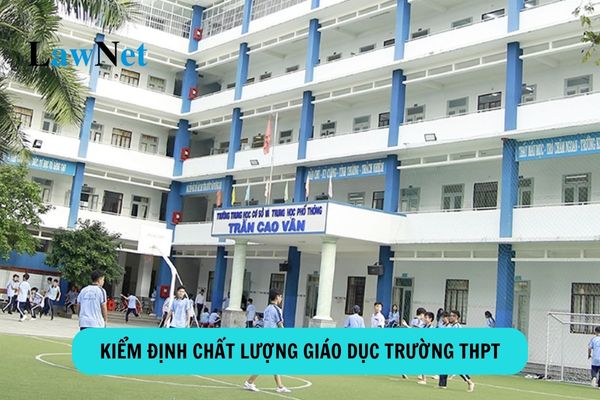What are purposes of quality assurance in upper secondary school education in Vietnam?
What are purposes of quality assurance in upper secondary school education in Vietnam?
Based on Clause 1, Article 3 of the Regulations on quality accreditation and national standard recognition for lower secondary schools, upper secondary schools, and multi-level schools (hereinafter referred to as the Regulations) issued together with Circular 18/2018/TT-BGDDT, the purposes of education quality accreditation for upper secondary schools are to:
- Determine the level to which the upper secondary school meets educational objectives in each period;
- Develop plans for quality improvement, maintenance, and enhancement of the school's activities;
- Publicly inform the state management agencies and society about the actual quality of the upper secondary school;
- Allow state management agencies to evaluate, recognize, or not recognize the school as meeting the education quality standards.

What are purposes of quality assurance in upper secondary school education in Vietnam? (Image from the Internet)
What is the process of education quality accreditation for upper secondary schools in Vietnam?
Based on Article 4 of the Regulations issued together with Circular 18/2018/TT-BGDDT:
Education quality accreditation process and national standard recognition process for lower secondary schools
The education quality accreditation process and the national standard recognition process for lower secondary schools are carried out in the following steps:
Self-assessment.
External assessment.
Recognition of schools meeting education quality standards and national standards.
Thus, the education quality accreditation process for upper secondary schools includes three steps:
Step 1: Self-assessment. Based on Article 23 of the Regulations issued together with Circular 18/2018/TT-BGDDT, the process of self-assessment for upper secondary schools includes the following steps:
(1). Establishing a self-assessment council.
(2). Developing a self-assessment plan.
(3). Collecting, processing, and analyzing evidence.
(4). Evaluating the achieved levels according to each criterion.
(5). Writing a self-assessment report.
(6). Publishing the self-assessment report.
(7). Implementing post-self-assessment report activities.
Step 2: External assessment. Based on Article 28 of the Regulations issued together with Circular 18/2018/TT-BGDDT, the process of external assessment for upper secondary schools includes the following steps:
(1). Reviewing the assessment documents.
(2). Conducting a preliminary survey at the school.
(3). Conducting an official survey at the school.
(4). Drafting an external assessment report.
(5). Receiving feedback from the school on the draft external assessment report.
(6). Finalizing the external assessment report.
Step 3: Recognizing schools that meet education quality standards.
What are the conditions and levels of recognition for upper secondary schools that meet education quality standards in Vietnam?
Based on Article 34 of the Regulations issued together with Circular 18/2018/TT-BGDDT, the recognition of schools meeting education quality standards is as follows:
Recognition of schools meeting education quality standards
- Conditions for recognizing schools meeting education quality standards:
a) Having at least one cohort of students who have completed the secondary education program;
b) Having an external assessment result of at least Level 1 as stipulated in Clause 1, Article 6 of these Regulations.
- Levels of recognition:
a) Level 1: The school is evaluated as meeting Level 1 as stipulated in Clause 1, Article 6 of these Regulations;
b) Level 2: The school is evaluated as meeting Level 2 as stipulated in Clause 1, Article 6 of these Regulations;
c) Level 3: The school is evaluated as meeting Level 3 as stipulated in Clause 1, Article 6 of these Regulations;
d) Level 4: The school is evaluated as meeting Level 4 as stipulated in Clause 1, Article 6 of these Regulations.
Thus, the conditions and levels of recognition for upper secondary schools that meet education quality standards are as follows:
- Conditions for recognizing schools that meet education quality standards:
+ Having at least one cohort of students who have completed the secondary education program;
+ Having an external assessment result of at least Level 1;
- Levels of recognition for upper secondary schools that meet education quality standards: there are 4 levels of recognition:
+ Level 1;
+ Level 2;
+ Level 3;
+ Level 4.
What is the validity period of the recognition certificate for upper secondary schools that meet education quality standards in Vietnam?
Based on Clause 2, Article 35 of the Regulations issued together with Circular 18/2018/TT-BGDDT:
Issuance of Certificates of schools meeting education quality standards and publicizing the results of education quality accreditation
- Within 20 working days from the date of receiving the external assessment report, the Director of the Department of Education and Training issues the Certificate of schools meeting education quality standards according to the level achieved (Certificate format as per Appendix I).
2. The recognition certificate for schools meeting education quality standards is valid for 5 years. At least 5 months before the expiration date of the recognition certificate, the school must complete the self-assessment process as stipulated in Article 23 and register for external assessment as stipulated in Article 26 of these Regulations to be re-recognized. The re-recognition process follows the stipulations in Article 34 of these Regulations.
- The results of the education quality accreditation of the school are publicly announced on the website of the Department of Education and Training.
Thus, the recognition certificate for upper secondary schools that meet education quality standards is valid for 5 years.

